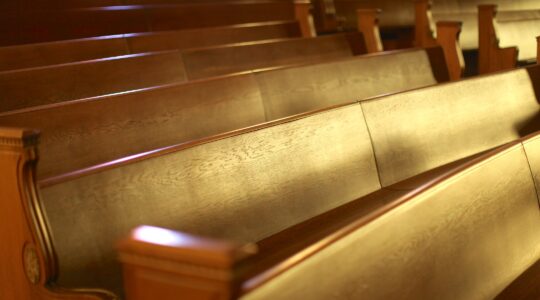The recent Chag HaSemicha (holiday of ordination) in Washington Heights, with 230 rabbinic graduates of Yeshiva University (classes 2011-14) taking center stage, was a much-needed shot in the arm for an embattled institution, and a reminder of its vitality and importance in the American Jewish community.
The ceremony comes at a time when YU is going through perhaps the lowest point in its history, dating back to 1886. It is not only in financial crisis, with its very survival at stake, but is suffering from the aftermath of a high-profile sexual abuse scandal, and concern that several of its most revered rabbinic faculty have moved closer to the fundamentalist camp of Orthodoxy, away from embodying YU’s motto of “Torah U’Maddah,” or, Torah and secular knowledge.
The most immediate risk for YU is financial. Moody’s Investors Service, whose latest credit rating for the university was downgraded last month to B3, or high credit risk, has warned that the school — with its two undergraduate colleges, for men and women, and graduate schools including those in medicine, law, Jewish education and social work — could run out of unrestricted cash by the end of next year. Moody’s attributed the problem to “poor financial oversight and high expenses.” Only 14 percent of the school’s $1.2 billion is available for operating expenses.
YU President Richard Joel, who in the first years of his tenure energetically set out to improve the quality of education and expand the university’s reach in the community, has seen his vision severely hampered since the Madoff scandal, in which YU lost more than $100 million.
In recent months the board of directors, criticized by Moody’s for its “unwillingness or inability to act,” has stepped up and assumed the task of restructuring the university in hopes of ensuring its survival. Outside consultants have been brought in and the race is on to reduce the size and expenses of the university without reducing its quality — and to accomplish this before the funds run out. It’s a tall order.
With it all, it is important for critics, and the wider society, to step back and think about how vital YU is — not just to the Orthodox community — and how much poorer we would be without the rabbis, doctors, lawyers, business leaders, social workers, Jewish educators and other upstanding communal leaders it produces.
YU is said to ordain more rabbis a year than all the other U.S. rabbinical schools combined, and most of its rabbis are both steeped in Torah knowledge and comfortable with life in modern society, a reality in part attributable to the fact that the rabbinical school is anchored by a university.
At a time when surveys confirm that increasing numbers of American Jews are moving either to fundamentalist Orthodoxy, on one extreme, or “no religion,” on the other, the Torah U’Maddah approach of Modern Orthodoxy, emphasizing a life of Jewish identity and learning while being fully active in American society, becomes all the more critical.
It is in our best interest that YU right itself, and survive and grow, with communal support, so that it can continue to educate tomorrow’s Jewish leaders.
The New York Jewish Week brings you the stories behind the headlines, keeping you connected to Jewish life in New York. Help sustain the reporting you trust by donating today.




